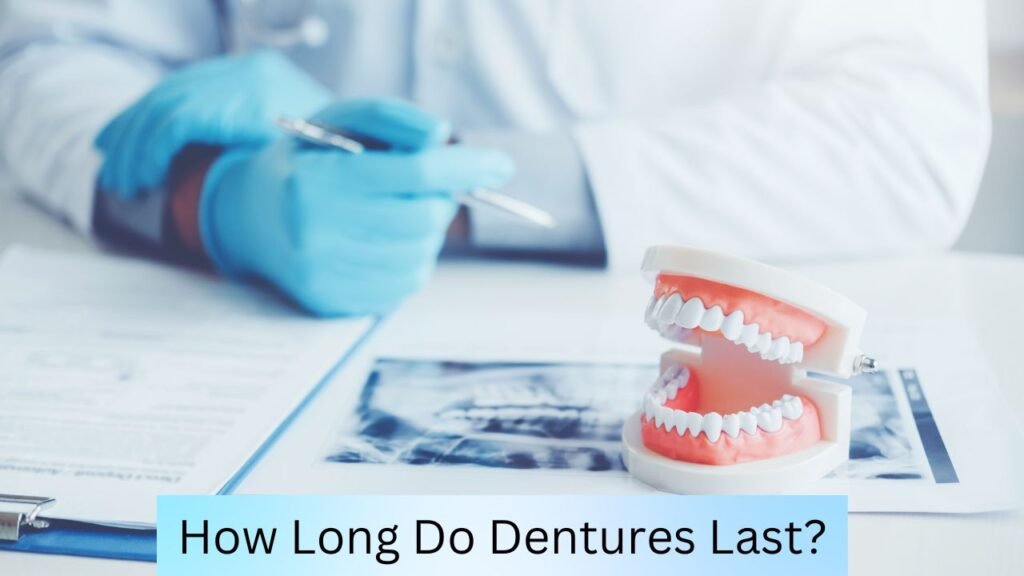Tooth loss can be a life-altering experience, impacting everything from your smile to your ability to enjoy meals. Dentures are a popular solution that restores both function and appearance, allowing you to speak, eat, and smile with confidence.
But how long do dentures really last, and what factors influence their lifespan? This guide will provide a detailed overview of denture longevity, factors affecting it, signs of wear, and tips for maintaining your dentures. Whether you’re new to dentures or seeking ways to extend their life, this article has you covered.
Understanding Denture Lifespan
Dentures are designed to last several years, but their lifespan can vary. On average, dentures last between 5 to 10 years.
However, this can be influenced by several factors, including the type of material used, your oral hygiene, and lifestyle habits.

Factors Affecting Denture Lifespan
- Material Matters: Different denture materials impact longevity and comfort. Here’s a breakdown of common types:
- Acrylic Dentures:
- Durability: Last about 5 to 7 years.
- Advantages: Lightweight, cost-effective, and adjustable.
- Disadvantages: Prone to staining and wear.
- Porcelain Dentures:
- Durability: Can last longer than acrylic.
- Advantages: Natural appearance and less likely to discolor.
- Disadvantages: Brittle and may chip under excessive pressure.
- Flexible Resin Dentures:
- Durability: Comparable to acrylic but more flexible.
- Advantages: Comfortable fit and less likely to crack.
- Disadvantages: Generally more expensive.
- Acrylic Dentures:
- Oral Hygiene: Proper care is crucial for extending the life of your dentures:
- Daily Cleaning: Brush dentures with a soft-bristled brush and a denture cleanser. Avoid using regular toothpaste, as it can be abrasive.
- Avoid Harsh Chemicals: Do not use bleach or other strong chemicals, as they can damage the material.
- Post-Meal Rinsing: Rinse dentures after meals to remove food particles and prevent staining.
- Bite Force: Excessive biting pressure can accelerate wear:
- Avoid Hard Foods: Chewing on hard items like nuts or ice can strain dentures.
- Manage Teeth Grinding: If you grind your teeth, use a night guard to protect your dentures.
- Gum Condition: Healthy gums are essential for maintaining a good fit:
- Monitor Gum Health: Changes in gum shape can affect how well dentures fit. Regular check-ups help manage these changes.
- Jawbone Density: As you age, changes in jawbone density can impact denture stability. Your dentist can suggest relining or adjusting dentures.
- Lifestyle Factors: Habits and diet play a role in denture longevity:
- Smoking: Smoking can stain dentures and impact oral health. Quitting smoking benefits both your dentures and your overall well-being.
- Diet: Limit foods and drinks that stain teeth, such as coffee and red wine.
Signs of Denture Wear and Tear
Understanding these signs helps you take timely action:
- Loose Fit
- Description: Dentures may become loose over time due to changes in the gums or bone structure.
- Action: If your dentures no longer fit well, visit your dentist for adjustments.
- Cracks and Chips
- Description: Physical damage from drops or hard foods can cause cracks.
- Action: Minor damage might be repairable, but significant cracks often require a new set of dentures.
- Discoloration
- Description: Stains from food or drinks can mar the appearance.
- Action: Clean dentures regularly and avoid staining substances.
- Soreness
- Description: Ill-fitting dentures can cause sore spots.
- Action: Persistent soreness should be evaluated by your dentist to determine if adjustments or a new set is needed.
Denture Care and Maintenance
Proper care extends the life of your dentures:
- Daily Cleaning Routine
- Morning and Evening: Brush dentures with a denture-specific cleaner twice daily.
- After Meals: Rinse dentures to clear away food debris.
- Soaking
- Purpose: Soaking dentures overnight in a denture-cleaning solution helps remove bacteria and stains.
- Recommendation: Use solutions recommended by your dentist.
- Relining and Repair
- Relining: Adds new material to the denture base to improve fit. Necessary as the shape of your mouth changes over time.
- Repair: Fixes minor damage but is not a substitute for a new set if significant damage occurs.
- Regular Dental Check-Ups
- Importance: Regular visits ensure proper fit, oral health, and necessary adjustments.
Denture Alternatives
If you’re considering alternatives to traditional dentures:
- Dental Implants
- Description: Implants are titanium posts placed in the jawbone to support dentures.
- Advantages: Stable, natural-feeling, and long-lasting.
- Considerations: Higher cost and involves surgery.
- Bridges
- Description: Bridges replace missing teeth by anchoring to adjacent natural teeth.
- Advantages: Provides stability and does not require surgery.
- Considerations: Requires healthy adjacent teeth and is less flexible than dentures.
Comparison Table
| Factor | Dentures | Dental Implants | Bridges |
|---|---|---|---|
| Cost | Lower initial cost | Higher initial cost | Moderate cost |
| Durability | 5-10 years | 15-20 years or more | 5-15 years |
| Appearance | Natural-looking | Very natural-looking | Natural-looking |
| Comfort | Variable | High | Moderate |
| Procedure | Non-surgical | Surgical | Non-surgical |
Conclusion
Understanding how long dentures last and the factors influencing their lifespan helps you maintain oral health and function. Proper care and timely adjustments are essential to extend denture life. If you’re facing issues with your dentures or considering alternatives, consult your dentist for tailored advice. Regular check-ups and good hygiene will ensure your dentures remain comfortable and effective.
Want to keep your dentures in top shape or explore better options? Schedule a dental check-up today and discover how to maintain your smile!
Find Your Perfect Dentist
Easily book appointments with top-rated dentists in your area
Need Emergency Dental Care?
Get immediate help from verified dental professionals